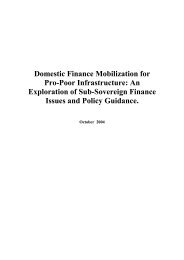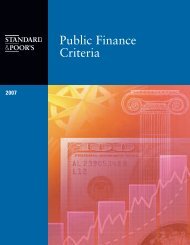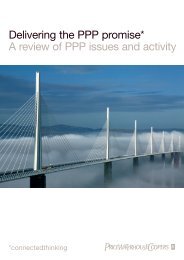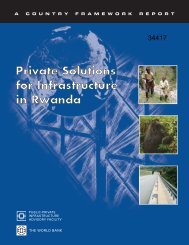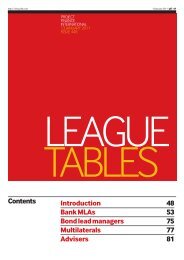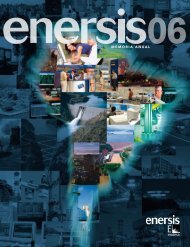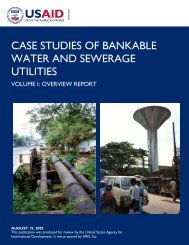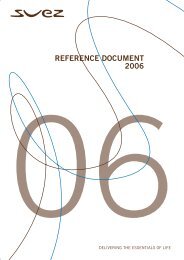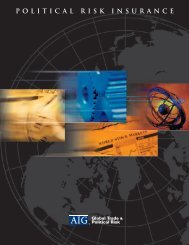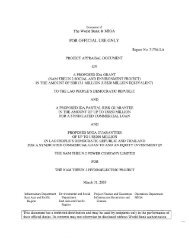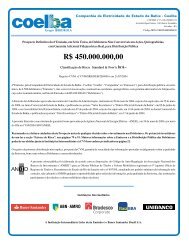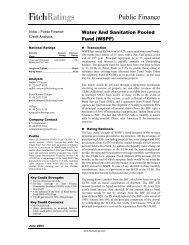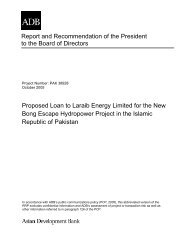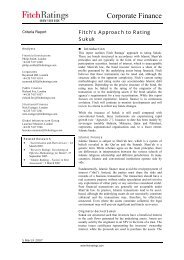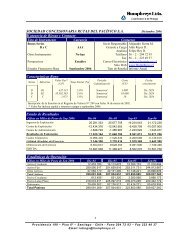EAP - The Pacific Infrastructure Challenge - World Bank (2006).pdf
EAP - The Pacific Infrastructure Challenge - World Bank (2006).pdf
EAP - The Pacific Infrastructure Challenge - World Bank (2006).pdf
You also want an ePaper? Increase the reach of your titles
YUMPU automatically turns print PDFs into web optimized ePapers that Google loves.
and there have been calls to reconsider the Fiji Telecom offer once again. This remains a<br />
hotly debated issue.<br />
<strong>The</strong> majority privately owned or controlled providers are:<br />
Marshall Islands: Citizens of the Marshall Islands own 75% of the incumbent<br />
operator, with individual shareholdings are limited to a maximum of 3%<br />
Samoa: Telecom Samoa Cellular is a joint venture between the Government of<br />
Samoa and Telecom New Zealand, which owns 90% of shares. Two competing<br />
private ISPs Samoanet and Lesamoanet operate off an internet backbone<br />
operated by Samoa Communications limited<br />
Solomon Islands: Solomon Telekom Company is a joint venture between the<br />
Solomon Island National Provident Fund, which holds 51% of the shares, Cable<br />
and Wireless with a 41.9% shareholding and the Investment Corporation of the<br />
Solomon Islands, which has 7.1% of the shares. Cable and Wireless has an<br />
exclusive operating license. <strong>The</strong> original 15 year license period was extended for<br />
another 15 years in 2003, and is up for review in 2008<br />
Timor-Leste: Almost all communications were destroyed in Timor in 1999.<br />
Public telecommunications services are being re-built under a 15 year Build<br />
Operate Transfer (BOT) arrangement with Timor Telecom and Portugal Telecom<br />
International awarded in 2001. In 2003 the Timor Telecom network provided<br />
nationwide voice and internet services covering Dili and twelve District capitals.<br />
Under this contract uniform tariffs apply across the country. <strong>The</strong> contact specifies<br />
that Timor Telecom must provide service at the same cost countrywide. Public<br />
and private institutions can build and operate their own networks based on<br />
satellite phones, but these may not be resold or offered publicly<br />
Vanuatu: <strong>The</strong> privatization arrangement in Vanuatu reflects the country’s<br />
condominium past with the shareholding divided three ways between the<br />
government, France Cable and Radio and Cable and Wireless. <strong>The</strong> latter two take<br />
turns to provide the General Manager.<br />
Cable and Wireless was the first international telecommunications company to pioneer<br />
privatization in the <strong>Pacific</strong> Islands Forum Secretariat countries when it entered into franchise<br />
agreements to provide international telecommunications services to the Cook Islands, Fiji,<br />
Solomon, Tonga and Vanuatu in the late 1970s. It continues to operate in Fiji, Solomon<br />
Islands and Vanuatu.<br />
Regulatory<br />
<strong>Pacific</strong> telecommunications companies are regulated by the Telecommunications Ministry in<br />
most countries. Only three countries have established an independent regulator. PANGTEL<br />
in Papua New Guinea was established in 1996 and has responsibility for establishing<br />
performance and technical standards, approving guidelines for carriers and monitoring<br />
compliance with license conditions.<br />
In Timor-Leste a legislative framework has been established and an independent regulatory<br />
body the Communications Regulatory Authority (ARCOM), created to regulate Timor<br />
Telecom. <strong>The</strong> BOT contract sets out the contractual conditions for the operator and tariffs<br />
are revisited regularly in negotiations between the regulator and operator. However, there is a<br />
need to strengthen the capacity of the regulator.<br />
88



